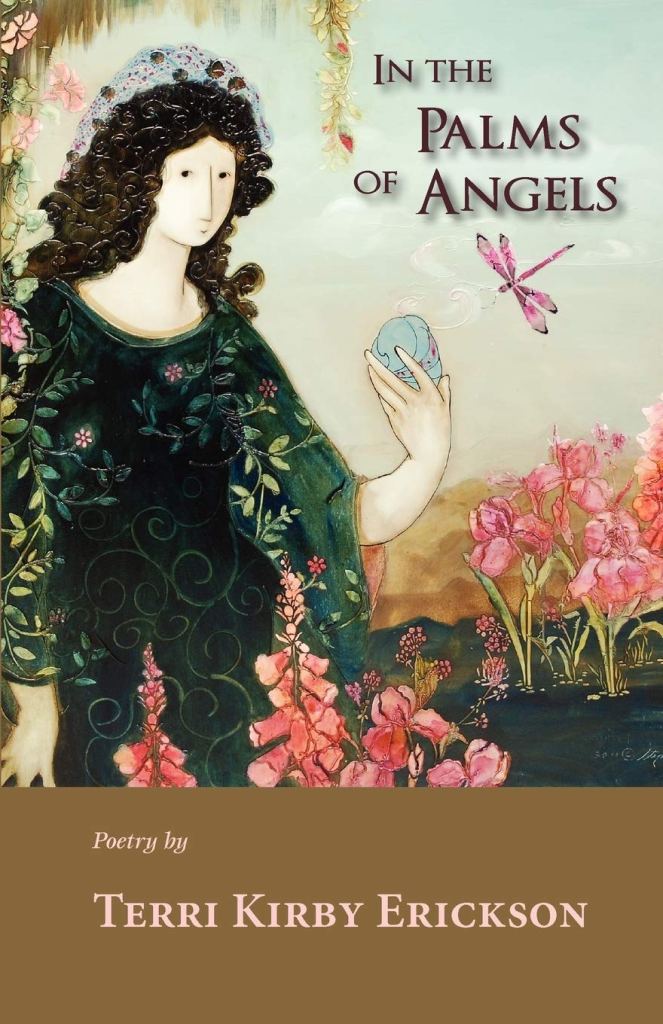
Winner of a Gold Medal for Poetry in the Next Generation Indie Books Awards and the Nautilus Silver Award for Poetry.
Praise for In the Palms of Angels:
“More than a poet, Terri Kirby Erickson is the best friend you always wanted, the kind you can count on both to tell you the truth, and to help you bear it. Her poems shimmer like moonlight on water in the farthest corners of your soul.” — Sharon Randall, syndicated columnist and author of Birdbaths and Paper Cranes
Terri Kirby Erickson’s In the Palms of Angels invites us to enter the world of everyday life made numinous by the poet’s voice. “Heaven,” for example, becomes a real place with white curtains billowing, the cry of gulls, the sizzle of bacon, a place where one wakes up among the things and people one has loved. Her poems become metaphorical palms in which angelic encounters are cradled.” — Kathryn Stripling Byer, former Poet Laureate of North Carolina and author of Wildwood Flower and Coming to Rest
“There is no store-bought redemption pasted to the ends of these poems, but neither will you find hopelessness, self-pity, a turning away from the world. What you will find at the core of all these poems is the timeless North Carolinian’s beneficent but ungilded witnessing.” — Ron Powers, Pulitzer Prize-winning journalist, author of Mark Twain, A Life, co-author of True Compass and Flags of Our Fathers
Poet Has Magic Touch
by Ruth Moose
Whatever you want from a poem, expect for a poem, you’ll find it here — and more.
Terri Kirby Erickson is a poet’s poet. A reader’s poet who can take the everyday, everywhere, everybody, put words on a page and pull you in. I couldn’t put this book down. (And that’s something you don’t say about poetry. A mystery maybe, but poetry?)
First of all, the voice is totally compelling. Erickson sees, records, presents.
She writes of a road crew eating lunch under a tree, the only shade for miles perhaps. More portraits: Uncle Jack, “the one never quite in the photograph,” our speaker says, “bought a car wash,” and “sad because he spent his days cleaning other people’s stuff when his own life was such a mess.” (Oh, the family stories that little pitchers with big ears gather.)
Or a small conversation between two women in a grocery store parking lot: “sharing sadness like a loaf of warm bread.” Then there’s Clovis who “has worked every day of her life since she was thirteen.” Miss Ruth, the Sunday School teacher “who thought so much of Jesus, she got teary-eyed just saying his name.” Denise and Merle “work at the Corner Pharmacy, easy jobs compared to what they did before,” aren’t prepared for an almost-altercation that changes their lives.
Erickson is our North Carolina “Spoon River Anthology.” She’s got the gift of capturing people on paper as skillfully as any fine portrait artist. Her quick, deft hand pins down the nuances, the quirks, the tell-tale traits that make us who we are.
It seems nothing escapes her. From gardens and chickens to a grandmother’s sponge bath.
And then there are memory poems, childhood, Walgreen’s, rock ’n’ roll, a girl in a green dress, Uncle John’s 1955 Fairlane. Story poems. Short stories! I loved them all.
Erickson is equally as adept at capturing a single image on a beach or in Beaufort, sunflowers, Appalachia, or “An Old Woman Looks Out the Window on Christmas Morning.”
These are poems to read and read again. A photo album. A scrapbook of North Carolina, a busy life between the lines, an inquiring mind that sees and records.
Terri Kirby Erickson has her pen in the palm of angels. Praise it. Praise her.
Ruth Moose is a longtime reviewer for The Pilot and an instructor in creative writing at UNC-Chapel Hill.
Finding What is in Poems
by Kathryn Milam
An insidious fear infuses many Americans. It has nothing to do with the economy or health care, education or politics, war or terrorists. This fear was instigated in grade school, propagated in high school and nurtured as we grew older. Its culmination has deprived us of a balm capable of soothing all other fears.
This fear is metrophobia, the fear of poetry.
Now in maturity, many of us are looking for deeper insight and have turned to poems despite our fear.
The great poet William Carlos Williams wrote, “It is difficult/ to get the news from poems/ yet men die miserably every day/ for lack/ of what is found there.”
In our search for what is found there, we stumble upon Terri Kirby Erickson, a North Carolina writer, whose poems offer understanding and answers, both literal and metaphorical. Her gentle work can quell our metrophobia.
Ericksonʼs new collection, In the Palms of Angels, chronicles the fundamentals and rituals of everyday life and everyday people with clarity, perception and attention to detail. Her subject matter ranges from biscuit-making to breast cancer, cling peaches to suicide, boogie-woogie to aging parents. What makes each poem notable, whether serious or light-hearted, is Ericksonʼs ability to convey the essential meaning of commonplace events.
Take the poem “Sponge Bath.” A daughter bathes her elderly mother, a mundane routine repeated throughout the world each day. But Erickson elevates that experience from ordinary to extraordinary in a few phrases:
my mother’s hand
becomes a cloud, and every bruise,
a rain-drenched flower.
She acknowledges the ugly, thin-skinned bruising of the old woman’s arm, yet finds beauty in the signs of aging and impending death. She recognizes the protective presence of the daughter’s hands, symbolic of the care between generations.
Story poems are some of my favorites, especially if they are humorous with a surprising twist. “Denise and Merle” is one such poem.
Two women work at the corner pharmacy. One night, when they are on duty alone, the store is robbed. Erickson describes these characters and the situation in a few lines and leads her readers to an unexpected end. Here is a snippet:
When Merle heard the lock turn in the back room and saw
the robberʼs panicked expression, she was shocked
beyond belief that her own flesh and blood would
abandon her to the mercy of an armed bandit ready
to snap at any minute and riddle the place with bullets.
Canʼt you picture Merle, astonished as she faces down the man with the gun?
I could continue with lists of remarkable poems and vivid images, but why donʼt you see for yourself? Whether you approach this book with trepidation or read poetry daily, youʼll want to take “In the Palms of Angels” to your front porch swing and spend a few summer afternoons luxuriating in Ericksonʼs words.
Perhaps, one cold day next winter, her images will return to you in warm and wonderful ways. Youʼll pull the book from your shelf and read with delight. Then youʼll know youʼve begun to unravel the meaning of William Carlos Williamsʼ observation. And youʼll realize, once and for all, that youʼve conquered any vestiges of metrophobia.
Kathryn Milam is a reviewer for Briar Patch Books.

